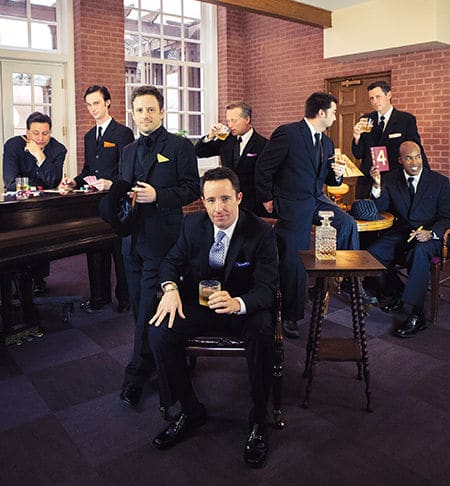Four Day Weekend
Sundance Square
312 Houston Street
Fort Worth 76102
817-226-4329
http://fourdayweekend.com
Yes and?
The “Yes and…” principle on stage calls for an actor to accept whatever a fellow actor says or does, but then add to it.
The “Yes and…” idea works on an organizational level by creating a culture in which anyone can come up with an idea and it will lead to more collaboration, according to Four Day Weekend members.
Four Day Weekend, the Fort Worth-based improvisational comedy troupe, has found almost two decades of fast-paced humorous success in saying “Yes” to all audience prompts, with nary an outright “No” or even a script.
So strong is their belief in their “Yes, and” technique that now they’ve parlayed it into a business model to present to young entrepreneurs.
Four Day Weekend, Entrepreneur-in-Residence at Texas Christian University’s Neeley School of Business, presented at the annual Bolin Innovation Forum on April 9 for the second time since 2014.
“Our intent was to put on a great comedy show,” said founding member David Wilk as he looked back to the group’s beginnings. “As it grew, everything just grew around us.”
They started their comedy career in 1997 with $700 and a six-week stand at a Houston Street theater. They were a hit, said “Yes” to staying on, “and” to getting a bigger share of the earnings. They added shows (they’re past 5,000 now), and before long they were recruited by the CEO of a big corporation to do a series of corporate workshops.
“One of us said, ‘Why don’t we use those main tenets to build a business?’” Wilk said.
A new facet of their career opened up, and they have presented to groups at Southwest Airlines, Hyatt Corp., FedEx, American Airlines and even the U.S. Congress.
They have grown their show into a company with a corporate communication division, a training center for up-and-coming improvisational artists, a touring company, television and film projects and children’s toys, plus being keynote speakers and authors.
“As we’re getting older, now we’re just funny entrepreneurs,” said Wilk, an Oklahoma transplant to North Texas.
Do they really use “ALL” the improv ideas that are thrown their way?
“Here’s the loophole,” Wilk said. “Nobody’s ideas are any better or any worse than anyone else’s. There are only higher and lower percentage points of success with an idea. We’ve found that out over 5,000 shows in 19 years.”
Their “trade secret” is to listen well and to build on the pertinent information of their comedy partners.
“If there is a bad idea, no one gets punished for it,” Wilk said. “Instead it’s a ‘yes, and.’
That’s the caveat. It’s a philosophy, not a statement.”
O. Homer Erekson, dean and professor of managerial economics and strategy at Neeley School
of Business, said department administrators were pleased to invite Four Day Weekend back as
feature presenters to the Bolin Innovation Forum. The forum is held each year in conjunction
with the Richards Barrentine Values and Ventures Competition, which draws business students
from all over the country and the world.
“I heard from numerous students from the 47 participating universities that it was inspiring for
them to hear how taking a ‘Yes, and’ approach can propel them over hurdles they may face as
aspiring entrepreneurs,” Erekson said.
Four Day Weekend found that improvisation and business have three common elements for success: collaboration, creativity and innovation.
“It’s an introduction to the culture shift of ‘Yes, and’ because if you hear ‘No, but’ too many times you quit presenting your ideas,” Wilk said. ““But’ is an acronym, ‘behold the underlying truth,’ we always say.”
Balancing the comedy club with business coaching has worked into a nice tradeoff for Four Day Weekend.
“When the [stock] market is down, they [business managers] see a line item for a corporate comedy show and say, we can do without this, and it gets cut,” Wilk said.
“The ‘comedy’ at the business may get cut, but the comedy business at the club does great.”
During the group’s hourlong presentation at TCU, Wilk, David Ahearn and Frank Ford kept students involved in a fast-paced, interactive dialogue “where your idea becomes our idea,” Wilk said.
“As an entrepreneur, you improvise every single day, all day,” Ahearn said. The “Yes, and” model encourages team members to offer their ideas without fear of ridicule or rejection, and it builds loyalty based on being appreciated.
The similar phrase “Yes, but” is not much better than “No,” the troupe members said.
“‘But’ is just a polite no,” Wilk said. “Whatever came along in the conversation before ‘but’ isn’t gonna fly.”
The best comedic part of the presentation came in a fast-paced example of “Yes, and” with an audience volunteer. The back-and-forth exchange started out as an imaginary golf game, but quickly built into a partnership with Leonardo DiCaprio, which ended badly, but then rebounded with a friendship with George Clooney.
The Four Day Weekend recap was, strike “No” from the entrepreneurial vocabulary, listen to all ideas brought forward, stay positive and reject the power of negativity.
“Some [business managers] say it’s better to be feared than loved,” said Ford. “In our world, it’s always better to be loved, always.”
“Fort Worth is a ‘Yes, and’ city, and TCU is a ‘Yes, and’ university.”
Visiting students leaving the group’s presentation were enthusiastic, using adjectives like “amazing” and “inspiring.”
“It was very entertaining,” said one student, Liban Sheikh of San Diego State University. “It was cool how TCU is presenting this.”
“I teach entrepreneurship and I use improvisation in the classroom myself. I’m glad to see they’re promoting it,” said Melanie Tedri, a faculty member at George Washington University.
“It was interesting,” said Cheyenne Tessiers, a student at GWU. “They had good advice for a changing business environment.”






